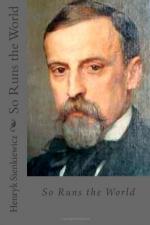HENRYK SIENKIEWICZ.
I once read a short story, in which a Slav author had all the lilies and bells in a forest bending toward each other, whispering and resounding softly the words: “Glory! Glory! Glory!” until the whole forest and then the whole world repeated the song of flowers.
Such is to-day the fate of the author of the powerful historical trilogy: “With Fire and Sword,” “The Deluge” and “Pan Michael,” preceded by short stories, “Lillian Morris,” “Yanko the Musician,” “After Bread,” “Hania,” “Let Us Follow Him,” followed by two problem novels, “Without Dogma,” and “Children of the Soil,” and crowned by a masterpiece of an incomparable artistic beauty, “Quo Vadis.” Eleven good books adopted from the Polish language and set into circulation are of great importance for the English-reading people—just now I am emphasizing only this—because these books are written in the most beautiful language ever written by any Polish author! Eleven books of masterly, personal, and simple prose! Eleven good books given to the circulation and received not only with admiration but with gratitude—books where there are more or less good or sincere pages, but where there is not one on which original humor, nobleness, charm, some comforting thoughts, some elevated sentiments do not shine. Some other author would perhaps have stopped after producing “Quo Vadis,” without any doubt the best of Sienkiewicz’s books. But Sienkiewicz looks into the future and cares more about works which he is going to write, than about those which we have already in our libraries, and he renews his talents, searching, perhaps unknowingly, for new themes and tendencies.
When one knows how to read a book, then from its pages the author’s face looks out on him, a face not material, but just the same full of life. Sienkiewicz’s face, looking on us from his books, is not always the same; it changes, and in his last book ("Quo Vadis”) it is quite different, almost new.
There are some people who throw down a book after having read it, as one leaves a bottle after having drank the wine from it. There are others who read books with a pencil in their hands, and they mark the most striking passages. Afterward, in the hours of rest, in the moments when one needs a stimulant from within and one searches for harmony, sympathy of a thing apparently so dead and strange as a book is, they come back to the marked passages, to their own thoughts, more comprehensible since an author expressed them; to their own sentiments, stronger and more natural since they found them in somebody else’s words. Because ofttimes it seems to us—the common readers—that there is no difference between our interior world and the horizon of great authors, and we flatter ourselves by believing that we are ’only less daring, less brave than are thinkers and poets, that some interior lack of courage stopped us from having formulated




